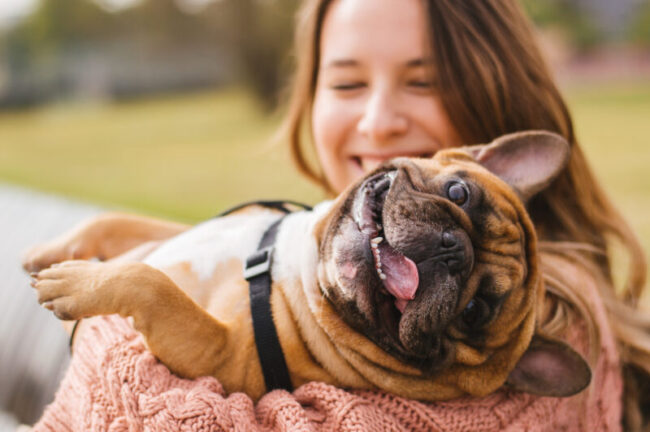Getting a dog seems like a great idea; however, when you bring home your rambunctious new companion, there is definitely a moment when you question your sanity. If this is you, then don’t worry. You aren’t alone. Most new dog moms feel like that from time to time. Obviously, you want to do right by your dog, but raising your dog can be really challenging when they are having behavioural issues, separation anxiety and displaying destructive traits. If you are feeling exasperated, then read on for some advice that you can use to help you to make it through the dog stage.
The First Few Weeks
Deciding to get a dog and finding the one you want from a breeder or rescue is an exciting experience – as are the first few days after you bring them home. However, once these initial feelings of excitement have worn off, you are likely to be brought back down to reality with a bump. Dogs are little balls of energy, and sometimes this energy comes out in destructive behaviours like chewing furniture. A lot of new dog owners worry that they have made a mistake when confronted with the absolute exhaustion that comes with those first few weeks of owning a dog. Just know that it is a learning curve, and you both need to adapt to one another. While it might be easier said than done, try to get through it and ride it out.
Dog Proofing
Dog proofing is essentially just damage limitation. You really shouldn’t give your dog the run of the house from the very beginning. They are just balls of energy that default to their basic instincts and behaviours because they have had no training, and they don’t know any better yet. They don’t care that your coffee table is an antique or that your favourite trainers are designer. An increase in access simply gives them more opportunities to make a mess. Your little dog won’t mean any harm, of course, but it can be upsetting, and it can make it harder to bond with them. To begin with, it makes much more sense to keep your new dog in its own space, like the kitchen or even crate train them for when you are leaving the house. You want to pick a room that is going to be easy to clean and has less for the dog to get into.
Feeding
The next thing that you need to think about is what you are going to feed your dog. Depending on where you get them from and whether it was a breeder or a rescue, they will likely tell you what they have been feeding them on and maybe even give you a limited supply. You don’t necessarily need to keep them on this food. You do need to pick something that is appropriate for the age group; you should also try to make the transition slowly, introducing a bit of the new food at a time to avoid overloading their system and giving them digestive issues. As your dog gets a little older, twenty-four weeks and above, you can start to think about whether or not you want to introduce supplements to their diet. This can be well worth doing, especially if you choose a high-quality brand like ProDog Raw which has a complete range of natural supplements for dogs for a myriad of issues, including:
- Skin and coat
- Performance
- Digestive
- Immunity
- Joints
Toilet Training
Another milestone in your young dog’s life is toilet training. It can be a frustrating activity. You need to come to terms with the fact that you are going to clean up a lot of wee and poo. You need to be patient and vigilant. There are a few different approaches but one of the easiest is simply taking your dog outside or letting it out into the garden at regular intervals – you might want to start with fifteen minutes before dropping back to thirty and then forty-five until you reach an hour et cetera – this increases the chance that they will go to the toilet outside, and when they do, you need to reward them with praise and treats to positively reinforce this behaviour.
Separation Anxiety
Separation anxiety works both ways, there are a lot of owners who worry about leaving their dog alone, and there are a lot of dogs who struggle being left alone. It is a cycle; you feel anxiety which you then pass to your dog. You try to avoid leaving them home alone, and so they don’t know how to be alone. When it comes to dispelling separation anxiety, it can be easier said than done. The feelings of guilt won’t go away overnight. If you are worried about the damage that they could do, it might be worth looking into crate training. Otherwise, you just have to bite the bullet and do it. Build up to leaving them for longer periods; start small with half an hour here and there.
Patience, Patience, Patience
Truthfully, coping with a new dog really comes down to one thing, and that is patience. It’s like having a newborn – except they have a lot more energy and teeth like little needles! You wouldn’t lose your rag and discipline a newborn, so don’t be too harsh with your dog. Positive reinforcement can go a long way in training them, and it also helps to make sure that they have bonded more securely with you. Things take time to fall into place. The dog phase doesn’t last forever, after all. Eventually, your dog will settle as they feel more at home, and you will be able to go back to normal – or a new version of your normal.
It is completely normal to feel overwhelmed and apprehensive when welcoming a new member into the family. It is a big shift, after all, and know you have another being that is wholly dependent on you. It really is like having a baby! Sometimes having patience is easier said than done when you’re stressed to the max, so if you need to take some time for yourself, then do it. You must know some people who would be happy to hang out with a dog for a few hours and babysit for you while you recharge and renew your mental reserves.
The Bottom Line
What you need to bear in mind is that all of your hard work has a purpose; the more time and effort you put in now, the more it’ll pay off when your dog gets a little older, so just keep persevering. Always try to remember that your new dog is just a baby itself. It isn’t being naughty or difficult on purpose to wind you up. It just doesn’t know any better. They will learn, but it takes time, and, really, it is in the training and time spent with your dog that you are able to build that bond and foster that connection with them. Finally, if you find yourself in over your head, it is totally okay to ask for help, whether that is taking them to dog classes, hiring a trainer or even talking to a vet about your concerns. If you have friends that are dog parents themselves, then they can also be a fantastic fountain of knowledge that you can go to to bounce ideas off.



